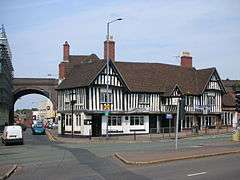The Old Crown, Birmingham
| The Old Crown | |
|---|---|
 | |
| General information | |
| Architectural style | Black and white timber frame |
| Town or city | Birmingham |
| Country | England |
| Coordinates | 52°28′29″N 1°53′01″W / 52.4747°N 1.8836°WCoordinates: 52°28′29″N 1°53′01″W / 52.4747°N 1.8836°W |
| Completed | 1450-1500 |
The Old Crown a pub in Deritend, is the oldest extant secular building in Birmingham, England.[1] It is Grade II* listed, and claims to date back to c. 1368, retaining its "black and white" timber frame, although almost all of the present building dates from the early 16th century.
History
It is believed the building was constructed between 1450 and 1500 with some evidence dating to 1492 (the same year the Saracen's Head in nearby Kings Norton was completed). Leland noted the building, upon entering Birmingham, in 1538 as a "mansion house of tymber". It is thought to have been originally built as the Guildhall and School of St. John, Deritend. The building was purchased in 1589, by "John Dyckson, alias Bayleys",[2] who, in the 1580s, had been buying a number of properties and lands in "the street called Deritend" and in Bordesley. Described as a tenement and garden, running alongside Heath Mill Lane, the building remained in the Dixon alias Baylis (later Dixon) family for the next hundred years.
In the original deed, John Dyckson is described as a "Caryer", which in the West Midlands at this time, when roads were nothing more than hollow-ways and bridle paths, implied that he owned several trains of pack-horses. These would have needed stabling, and Dixon would have needed warehouse space to store goods awaiting dispatch, and arrived goods awaiting collection. Such facilities would be useful to other travellers, and it may well be that the use of the house as an Inn, dates from this time. Indeed, since England was in the grip of a patriotic pother over the failed Armada the previous year, it would have been opportune to adopt the name: 'the Crown'. However, the earliest documentary evidence of the building’s use as an Inn is from 1626;[3] and it being "called by the sign of the Crowne", from 1666.[4]
Heated skirmishes were fought around the building when Prince Rupert's forces raided Birmingham during the English Civil War.
The building was converted into two houses in 1684 and then converted into three houses in 1693. It remained three houses until the 19th century. In 1851, Joshua Toulmin Smith saved the Old Crown from demolition when the Corporation proposed demolishing the building in order to "improve the street". Again in 1856 and 1862 the Corporation proposed to demolish the building; Smith saved the building each time.
On 17 July 1957, David "Chuffa" Hughes was born in this pub to his mother Florence Hughes (née Crow) and father Alan Hughes, who owned the pub for many years. They sold up when David was three and emigrated to Australia. William Saunders (b. 1435) is ancestor to David Hughes, and sat down in the very same pub David was born in around 500 years before David.
Construction
The building is 71 feet 4 inches wide and 20 feet 2 inches deep on the ground floor. On the first floor, which overhangs the front, it is 21 feet 9 inches deep. When built, the original building had a central hall with a length of 40 feet and a width of 20 feet. Below this was a number of arched cellars. On the upper floor were just four rooms. The building had a courtyard to its rear which contained a well. It was 26 feet deep and surrounded by large stones. The well was excavated and deepened to produce a total depth of 38 feet. The new section of the well was lined with square bricks. At the top, it was two feet, seven inches at its narrowest diameter and two feet, nine inches at its widest diameter. It widened to around four feet at the bottom. The well was cleaned in 1863 and Smith added an iron gate to the top of it to preserve it whilst keeping it accessible.
See also
References
- ↑ "Birmingham City Council: entry for The Old Crown". Retrieved 4 May 2012.
- ↑ Deed of sale dated 20 September 1589. The deed is endorsed, about 1680: "The deedes of the Crowne house". (Birmingham Archives and Heritage, MS 3881/35).
- ↑ Bond by Thomas and Richard Fetherston to "Thomas Dixon alias Bayleys, Inholder"; 20 Oct 1626. (Birmingham Archives and Heritage, MS 3881/42).
- ↑ In a marriage settlement dated 21 Dec 1666. (Birmingham Archives and Heritage, MS 3881/48).
Sources
- Toulmin Smith, Joshua (1863). Memorials of Old Birmingham - Traditions of The Old Crown House in Der-Yat-End in the Lordship of Birmingham. Henry Wright, Temple Buildings, New Street.
- Thompson, Michael J (1994). The Old Crown House at Deritend, Birmingham: glimpses of its history, owners and landlords from 1368. publisher. ISBN 0-9523854-0-6.
- Historic England. "Details from image database (217289)". Images of England.